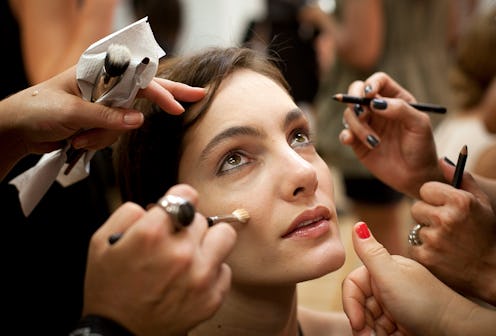Fashion
Why Should Finally Stop Sharing Makeup For Good
Listen up: It's time to stop sharing your makeup with other people. Like, for real this time. Not only are you losing valuable product, but you are also risking your own health while you're at it. While it may seem harmless at the time, trading makeup can lead to very serious conditions such as pink eye or even herpes. How gross is that?!
I know, I know. You've probably heard you shouldn't share makeup before. But really think about what your own makeup and tools touch in a day. They glide across flaky skin, chapped lips, and popped zits. It's not exactly the most hygienic of routines. If that is just what your own makeup touched on your skin, what could it possibly touch on your friend's?
If you don't think swapping lipsticks is that big of a deal, consider this: Makeup is the perfect breeding ground for bacteria. Everything from its wet formula to dark containers can help germs to procreate. It can even cause diseases to spread or transfer. And while your face may not be affected by certain germs on your skin, your friend or coworker may not be so lucky. So keep everyone looking their best by keeping your makeup to yourself. It isn't worth risking the health of those around you just to try out that new liner. Here are seven scary truths about what can happen when you swap cosmetics.
1. Sharing Eye Makeup Can Lead To Eye Infections
Your eyes are one of the most delicate features on your face, and they also hold a lot of personalized bacteria. According to dermatologist Jeanine B. Downie, in an interview with New Beauty, “Sharing cosmetics, especially mascara, eyeshadow and eyeliner, can lead to a bad eye infection." Think pink eye, flat warts, styes, and other bacterial buildup. This is especially true for those who wear contact lens as the bacteria can get trapped behind the lens, according to BuzzFeed.
2. Borrowed Lipstick Can Leave You With Cold Sores
Keep cold sores at bay by keeping your lip colors to yourself. Even if it doesn't look like your friend has any irritation, they could carry the virus that causes them. According to dermatologist Larry Beatty in an interview with Cosmopolitan, the condition could stay with you for life if you pick it up.
3. Makeup Testers Can Harbor Bacteria
While those testers may be tempting, please don't apply them directly to your face. According to InStyle, makeup testers are one of the top ways that bacteria spreads through cosmetics. So next time you're in Sephora make sure to swatch the product on your hand instead of on your face, and always use a cotton swab or other disposable tool to grab the color, rather than dipping your fingers straight in.
4. You Don't Know How Your Friend Applies Product
While you may diligently use clean brushes and applicators to apply your creamy, potted products, your BFF or coworker may not. Hands are a huge carrier of bacteria, and should rarely be used to apply makeup products.
5. Makeup Can Gather Bacteria Anytime
Forgot to recap your lipstick? Didn't tighten your foundation bottle properly? Even when products aren't being used, they could still be gathering bacteria. Gross, right? According to Dr. Kelly Reynolds in an interview with BuzzFeed, "Fungal spores are everywhere," and could be infecting your makeup. Even though many water-based makeup products are filled with bacteria-fighting preservatives, take the extra step by removing your makeup from any moist areas (like a bathroom) and properly closing each product. .
6. It Can Lead To A Staph Infection
While others may not be susceptible to certain infectious germs that doesn't mean that you aren't. According to Today.com, many infections such as Staphylococcus aureus and Staphylococcus epidermidis can be hiding in your makeup. It just takes the right conditions and the right grouping of bacteria to set an infection into motion.
7. It Can Make Your Acne Worse
Acne may not be contagious, but it can definitely be irritated. Using someone else's makeup brushes or base makeup can spread acne-causing bacteria. Basically, someone else's acne, oils, and bacteria are touching your face. We all know that can't be good for your skin.
Do yourself (and your skin) a favor by keeping your makeup to yourself. While it may be fun to share makeup products, it isn't worth the health hazards.
